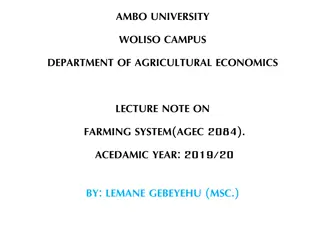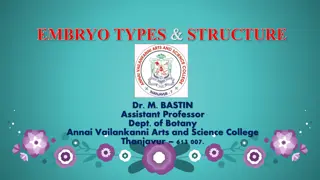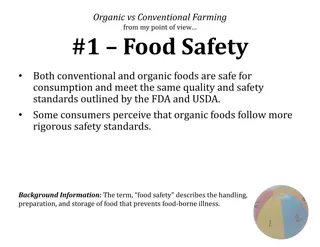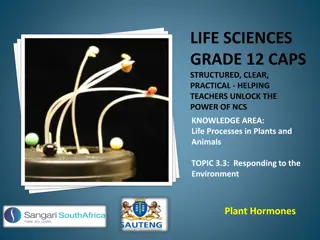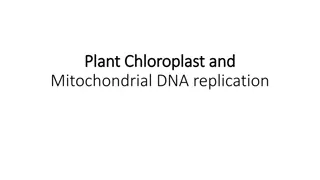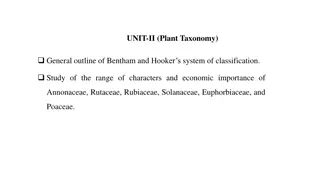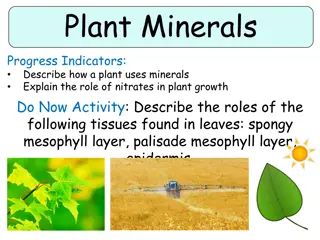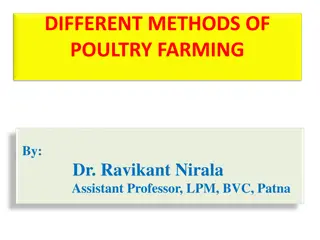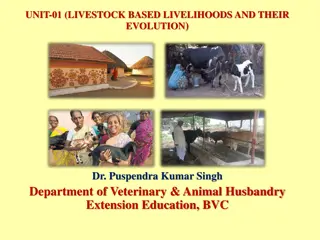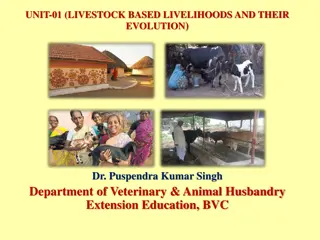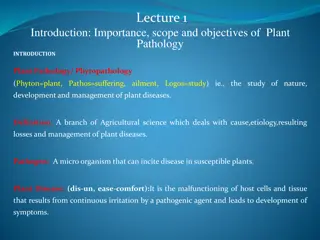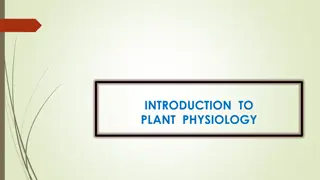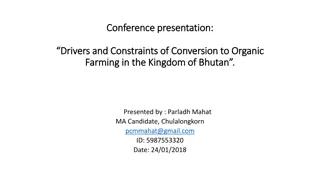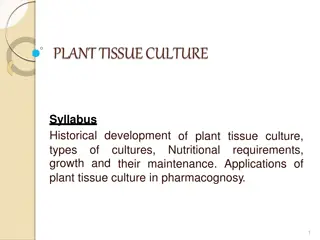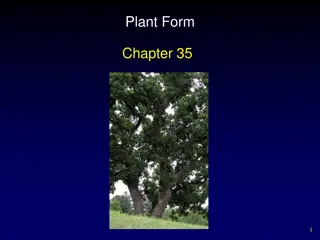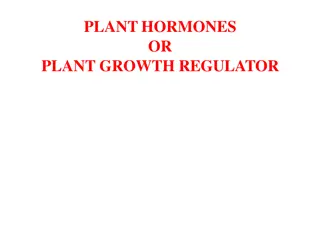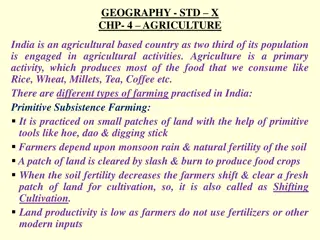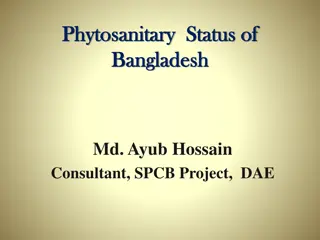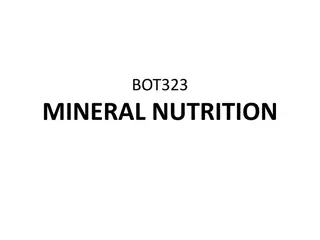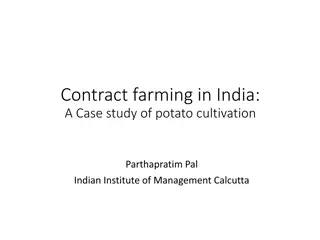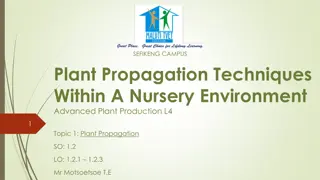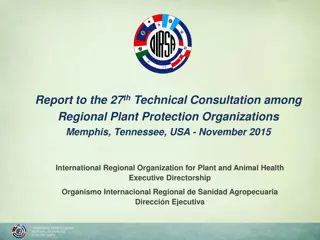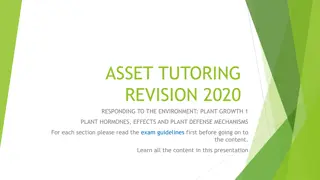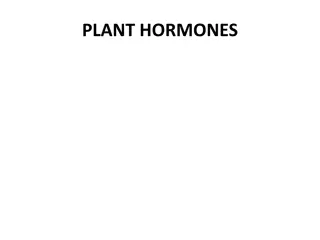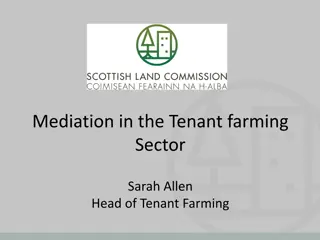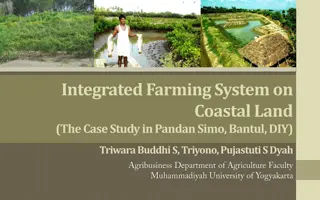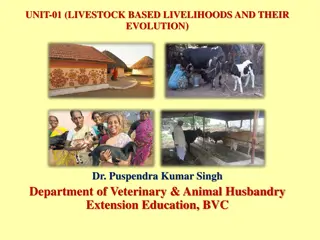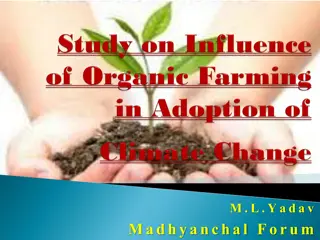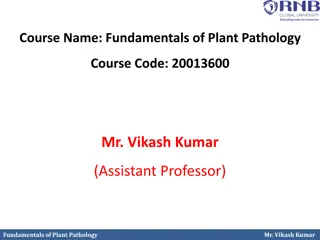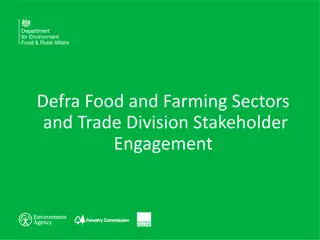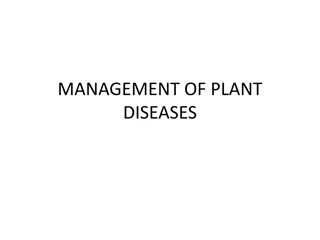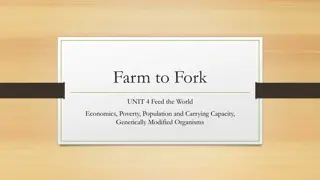Unit 1: Introduction and History of plant pathology
The science of plant pathology, which studies plant diseases and aims to protect the food supply by improving plant survival in unfavorable conditions. Explore the causes of plant diseases, their symptoms, and methods of prevention and control.
5 views • 13 slides
Amway Nutrilite All Plant Protein Powder 1kg Deutsche Post AG
Amway Nutrilite All Plant Protein Powder is a premium source of protein derived from plant-based ingredients. With each serving, you get a blend of high-quality protein to support your active lifestyle and dietary needs.\nAmway Nutrilite All Plant Protein Powder offers a convenient way to supplement
1 views • 4 slides
Understanding Farming Systems in Agricultural Economics
Concepts of farming systems research and development are crucial for effective agricultural management. A farming system encompasses various components that work together to achieve specific objectives. It involves the arrangement and management of farming enterprises in response to environmental fa
0 views • 49 slides
Understanding Plant Embryogenesis: A Comprehensive Overview
Plant embryogenesis is a crucial process in the development of plant embryos from fertilized ovules, involving cell division, differentiation, and morphogenesis. This process leads to the formation of seeds, which play a vital role in the plant life cycle. The stages of embryo formation, structure,
1 views • 25 slides
Organic vs Conventional Farming: An Overview
In the debate between organic and conventional farming, both methods have their pros and cons. While organic foods are perceived to follow stricter safety standards, both types meet FDA and USDA regulations. They offer similar nutritional value, but organic farming tends to have lower efficiency due
0 views • 6 slides
Understanding Plant Tissue Culture: Methods and Requirements
Plant tissue culture involves the in-vitro culture of plant explants under aseptic conditions, covering cell, organ, and suspension cultures. This process, pioneered by German botanist Gottlieb Haberlandt, relies on the totipotency of plant cells. Key requirements include laboratory organization, su
0 views • 18 slides
Understanding Plant Hormones and Their Functions in Plants
Plant hormones play crucial roles in various plant processes such as growth, development, and response to environmental stimuli. Auxins, gibberellins, and abscisic acid are key plant hormones that regulate tropisms, cell division, elongation, flowering, seed germination, and dormancy. Understanding
1 views • 50 slides
Plant Mitochondrial and Chloroplast DNA Replication Mechanisms
Plant mitochondria and chloroplasts have intricate DNA replication processes. Mitochondrial DNA replication is independent of the plant cell cycle and is associated with specific proteins in nucleoid complexes. Plant mtDNA contains more genes than animal mtDNA, with a complex structure involving int
1 views • 16 slides
Overview of Bentham and Hooker's Classification System in Plant Taxonomy
Bentham and Hooker's system of classification in plant taxonomy, outlined in Genera Plantarum, provided detailed descriptions of families and genera based on original plant dissections. This classification system has practical value for plant identification, with keys for taxa and subdivisions for l
3 views • 47 slides
Understanding Plant Tissue Culture Media and Their Importance in In Vitro Growth
Plant tissue culture media play a crucial role in the in vitro growth and morphogenesis of plant tissues. The composition of culture media depends on the specific plant species and the type of material used for culture. Various types of media, such as White's medium, MS medium, B5 medium, N6 medium,
0 views • 6 slides
Plant Minerals and Farming Methods
Learn about how plants use minerals for growth, the role of nitrates, different leaf tissues, mineral deficiencies, and farming methods to ensure crop yield. Discover how plants obtain minerals from the soil, symptoms of mineral deficiencies, and the importance of fertilizers in farming. Explore dif
0 views • 13 slides
Diverse Methods of Poultry Farming and Agricultural Practices
Poultry farming practices such as organic farming, nitrogen fixation, biodiversity management, and contract farming are discussed. Organic farming emphasizes holistic relationships in agriculture, promoting sustainable production. Nitrogen fixation and biodiversity management play essential roles in
0 views • 20 slides
Evolution of Livestock-based Livelihoods and Capitalistic Farming Systems
Livestock-based livelihoods have evolved over time, with capitalistic farming systems emerging as prominent in regions like South America, North America, and Europe. These systems are characterized by individual entrepreneurs controlling farming activities. Plantations are a common example of capita
0 views • 10 slides
Livestock-based Livelihoods and Farming Systems Evolution
Livestock-based livelihoods and farming systems have evolved over time, aiming to produce food and crops sustainably. Small-scale farming, farm management, types of farming, and various farming systems like specialized and diversified farming play key roles in enhancing productivity, profitability,
9 views • 19 slides
Contract Farming in India: A Case Study of Potato Cultivation
Value addition in Indian agriculture is low due to poor processing levels. Contract farming is being considered to integrate agriculture production into the global value chain, but concerns about unequal bargaining power between farmers and corporations exist. Various forms of contract farming exist
0 views • 26 slides
Understanding Plant Pathology: Importance, Scope, and Objectives
Plant pathology, also known as phytopathology, is the study of plant diseases and their management. It covers the causes, symptoms, and impact of pathogenic organisms on plants. The field aims to understand the interactions between plants and pathogens, develop control methods, and reduce losses in
0 views • 6 slides
Introduction to Plant Physiology: Exploring the Functioning of Plants
Plant physiology is a crucial subdiscipline of botany that delves into the processes and functions operating within plants. This field closely examines areas like plant morphology, ecology, cell biology, and genetics, shedding light on vital processes such as photosynthesis, respiration, and more. T
1 views • 7 slides
European Standards for Plant Biostimulants Development
The European Committee for Standardization (CEN) plays a crucial role in developing European standards for plant biostimulants, focusing on improving plant nutrition processes independently of nutrient content. The CEN/TC.455 committee is responsible for creating standards supporting the EU Fertilis
2 views • 5 slides
Exploring Drivers and Constraints of Conversion to Organic Farming in Bhutan
Population in Bhutan heavily relies on agriculture, but the transition to organic farming has been slow despite the desire to reduce chemical use. This presentation investigates the current state of organic farming, identifies key factors affecting conversion, and offers policy recommendations to pr
0 views • 22 slides
Understanding Plant Tissue Culture: Techniques and Applications
Plant tissue culture involves maintaining and growing plant cells, tissues, or organs in artificial mediums under controlled conditions. It allows the regeneration of whole plants from small plant parts or cells. Hormones like auxins, cytokinins, and gibberellins are used in the process. Proper envi
3 views • 5 slides
Plant Tissue Culture: Historical Development, Techniques, and Applications
Plant tissue culture is an experimental technique that involves the in-vitro cultivation of plant cells to produce secondary metabolites, regenerate plants, and study organogenesis. This process allows for the maintenance of disease-free plant material, biosynthetic pathway tracing, and cell immobil
0 views • 21 slides
Understanding Plant Meristems and Growth Patterns
Explore the fascinating world of plant meristems, the small clumps of cells responsible for elongation of roots and shoots, as well as the different types of primary meristems and their roles in plant growth. Learn about apical and lateral meristems, primary tissues, and the organization of the plan
0 views • 33 slides
Understanding Plant Hormones and Growth Regulators
Plant growth regulators, also known as plant hormones, play a crucial role in regulating growth and development in plants. They are organic compounds that act at low concentrations to promote, inhibit, or modify growth processes. The main plant hormones include auxins, cytokinins, gibberellins, absc
1 views • 40 slides
Plant Tissue Culture Methods for Growth and Reproduction Study
Plant tissue culture methods such as root tip culture, shoot-tip culture, leaf culture, flower culture, and anther and pollen culture allow for the study of growth, reproduction, and genetic variations in plants. These techniques involve culturing various plant parts under sterile conditions to inve
1 views • 20 slides
Agricultural Practices and Major Crops in India
India is predominantly an agricultural-based country with two-thirds of its population engaged in farming. The country practices different types of farming, including primitive subsistence farming, intensive subsistence farming, and commercial farming. The cropping seasons in India are classified as
0 views • 8 slides
Understanding Plant Quarantine and Phytosanitary Measures
Plant quarantine involves efforts to prevent the entry, establishment, or spread of foreign pests through legal restrictions on plant and plant product movement. It is crucial for safeguarding plant health, food production, and ecosystems. Phytosanitary measures aim to ensure the health of plants by
0 views • 33 slides
Understanding Mineral Nutrition in Plants
Mineral nutrition in plants involves the acquisition of essential elements in the form of inorganic ions from soil, followed by their absorption and utilization in various plant processes. Around 60 different elements have been reported in plants, with 30 being essential for plant growth. These esse
0 views • 39 slides
Contract Farming in India: Enhancing Agricultural Value Chain Through Partnerships
Value addition in Indian agriculture has been low due to limited processing levels. Contract farming is emerging as a viable solution to integrate agriculture production into the global value chain, albeit with concerns about unequal bargaining power. Various forms of contract farming exist, with ex
0 views • 26 slides
Plant Propagation Techniques in Nursery Environment
Learn about plant propagation techniques within a nursery environment, including nursery operations, potting seedlings, plant protection, weed control, packing of nursery plants, and crafting tissues for plant growth. Explore the essential tasks involved in nurturing seedlings and trees before they
0 views • 17 slides
Plant Health Initiatives at the 27th Technical Consultation Among Regional Plant Protection Organizations - Memphis, Tennessee
The 27th Technical Consultation in Memphis, Tennessee focused on plant health initiatives by the International Regional Organization for Plant and Animal Health. OIRSA emphasized four key technical areas: plant health, animal health, agricultural quarantine, and food safety. Projects included addres
0 views • 13 slides
Plant Growth Hormones and Defense Mechanisms: Understanding Plant Responses to the Environment
Plant growth hormones and defense mechanisms play crucial roles in how plants respond to environmental stimuli such as water, sunlight, gravity, and more. From auxins promoting cell growth to gibberellins stimulating flowering, this presentation educates on the intricacies of plant hormones and thei
1 views • 13 slides
Understanding Plant Hormones and Their Role in Growth and Development
Plant hormones are vital compounds that regulate various processes in plant growth and development. They are mostly organic and can be gases. These hormones are produced in one part of the plant and transported to other parts where they induce physiological effects. The main phytohormones include Au
0 views • 125 slides
Enhancing Mediation in the Tenant Farming Sector
Sarah Allen, Head of Tenant Farming, leads initiatives to promote mediation in the tenant farming sector, aiming to improve relationships between landlords and tenants. The Tenant Farming Commissioner under the Land Reform Act 2016 encourages mediation for resolving complex disputes. The pilot media
0 views • 9 slides
Integrated Farming System on Coastal Land: A Case Study in Pandan Simo, Bantul, DIY
The coastal area in Pandan Simo, Bantul, is embracing integrated farming systems combining food crops, horticulture, and livestock due to diminishing agricultural land. Farming on marginal lands like beaches has become a prevalent alternative. This case study aims to assess farming feasibility and r
0 views • 10 slides
Evolution of Livestock-Based Livelihoods: From Estate Farming to Specialized Crop Cultivation
Estate farming, a form of industrialized agriculture introduced by the British in the 19th century, involves large monocultures of cash crops like tea, rubber, and spices. It requires significant investment in modern farming techniques, machinery, and skilled labor. Estate farming is capital-intensi
0 views • 8 slides
Study on Climate Change and Organic Farming Impact by Madhyanchal Forum
Madhyanchal Forum conducted a study on the impact of climate change on agriculture and the effectiveness of organic farming in mitigating climate change. The study involved various organizations and farmers across different regions, focusing on the adoption of sustainable farming practices. Detailed
0 views • 16 slides
Exploring the Fundamentals of Plant Pathology: Understanding Viruses in Plant Diseases
Delve into the world of plant pathology with Mr. Vikash Kumar, as you learn about the nature, structure, and transmission of viruses affecting plants. Explore the important characteristics of plant viruses, their unique properties, and how they interact within plant cells. Gain insights into viral d
0 views • 14 slides
Sustainable Farming Incentive Stakeholder Engagement Meeting
The meeting hosted by Defra's Food and Farming Sectors and Trade Division aims to gather feedback on the Sustainable Farming Incentive pilot standards and payment processes. Stakeholders in the Arable Sector can provide expert input to shape the development of the program, ensuring farmers' active p
0 views • 20 slides
Overview of Plant Quarantine and Disease Management
Plant quarantine is a crucial practice that involves regulating the movement of plants and plant products to prevent the spread of pests and diseases. Originating with the first law in France in 1860, plant quarantine now encompasses various methods such as embargoes and inspections to safeguard pla
0 views • 11 slides
Sustainable Agriculture: Feeding the World and Future Farming Practices
Explore the dynamics of farming from rural to urban settings, understanding factors like supply and demand, seasonal eating, and sustainable agriculture practices through the lens of economic, poverty, and population considerations. Discover how different farming practices meet market demands, how r
0 views • 55 slides


